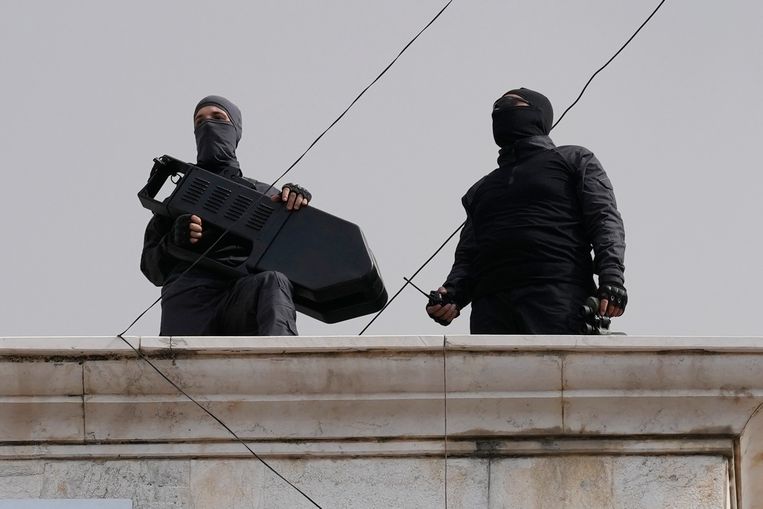The United States has sent more troops and equipment to the Middle East since the October 7 attacks by Hamas to protect Israel and deter its enemies. But Iran and its allies have not been idle. Every day they are carrying out new military operations in northern Israel to delay the invasion of southern Gaza. Yemen’s Houthi rebels are also firing missiles at US warships off the coast. So the prospect of a direct clash between Hamas and Israel’s formations is more real than ever, resulting in a regional war.
While the US and Iran accuse each other of trying to destabilize the entire region, neither country wants to engage in direct conflict. The US has raised the stakes with its presence in the region, but Iran prefers to achieve its goals in a different way, namely through its allies in the region: Hezbollah in Lebanon, Iraqi Shiite militias and Houthi rebels in Yemen. called the ‘axis of resistance’.
‘Opening other nodes’
Iran’s Foreign Minister Hossein Amir-Abdullahian threatened last week that “if the war crimes against the Palestinians are not stopped immediately, other fronts will be opened.” The nodes he specified are opening more and more.
Attacks by Shia Hezbollah on Israel continue parallel to Israel’s attacks on Gaza. Iranian-backed Hezbollah has been trying to relieve Hamas of rocket attacks on Israel and throw a spanner in the works for Israeli plans for a ground attack. That tactic seems to be working: Although Israel claims it can fight two fronts at once, the feared ground offensive has yet to materialize. Also, the arrival of US aircraft carriers in the region sends a signal that the Americans doubt Israel’s ability to fight on multiple fronts at once.
Iran and its allies are also scrutinizing the US military’s physical capabilities and readiness. US Defense Secretary Lloyd Austin recently warned of “a significant increase in attacks targeting our forces” in the Middle East.
As the U.S. plans a possible intervention against Hezbollah in Lebanon, Iran’s Shiite allies in Iraq are attempting to destabilize U.S. targets by launching attacks in Iraq. In one week, three US military bases in Iraq were attacked by missiles and drones by Shia militias in the country. As Hezbollah seeks to relieve Hamas by increasing attacks on Israel, Shiite militias in Iraq are attempting to reduce American pressure on Hezbollah by attacking American targets.
Houthi rebels unite
Meanwhile, the powerful Houthi rebels in Yemen, one of Iran’s main allies in the region, have also taken action. The rebels are staunchly anti-American and anti-Israel, disciplined, fanatical, hardened by the country’s harsh conditions, and have extensive experience in combat. The Houthis also possess Iranian drones and missiles so they can disrupt maritime (trade) traffic in the Red Sea and attack US targets in the Middle East.
They fired four cruise missiles and more than a dozen armed drones at Israel from Yemen last week, but these were intercepted in time by the US Navy. Their message was clear: any regional war involves the Houthis.
Iran wants to lead the war, but not fight it
Iran itself has seen remarkably little movement since the war in Gaza. The country has not had large-scale military operations overseas for decades. Although Tehran has sent thousands of soldiers and advisers to Iraq in the war against Islamic State to help Syrian President Bashar al-Assad stay in power, it has always avoided direct confrontation with the United States and Israel. Iran wants to lead the war against Israel and the US, but does not want to lead it. Erupting a regional war would change that, something Iran is reluctant to do because of the country’s economic woes.
Iran believes that limited attacks by its allies on Israeli and US targets in recent weeks will be enough to deter Israel from an invasion. At the same time, the Americans hope that Tehran will restrain its allies to avoid a regional war. But no one wants to pay the price to prevent a large-scale conflict. It loses face and gives up support to a partner in need.
read more:
Russia benefits from fighting between Israel and Hamas – but not much fighting
Russia benefits from unrest in the Middle East. Unless it gets completely out of hand.

“Passionate analyst. Thinker. Devoted twitter evangelist. Wannabe music specialist.”






More Stories
UNRWA needs money because of US sanctions and is seeking help from Arab countries
More men are getting abortions in the US after new abortion laws
Amazon launches Inspire to compete with TikTok Store in US!